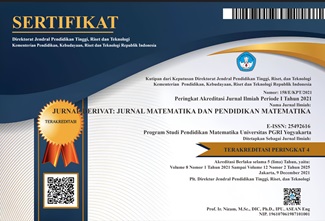Pengaruh Efikasi Diri Terhadap Hasil Belajar Matematika Siswa Kelas X SMAN Di Jakarta Barat
DOI:
https://doi.org/10.31316/jderivat.v10i2.6496Abstract
The purpose of this research to know the effect of self-efficacy toward mathematic achievement. The research was carried out in April 2024 with sample as many as 70 students which was determined by using simple random sampling technique. Data was obtained through student mathematics learning outcome test instruments and self-efficacy questionnaire instruments. The instrument has been tested for validity and reliability so obtained is valid and reliable. Testing requirements analysis using a normality test with Lilliefors retrieved that students learn math results and self-efficacy Gaussian. After the data Gaussian regression linearity test and do significance of regression obtained that the results of learning math students and self-efficacy of significant regression and linear regression. Based on data calculation of the research results, a significance value result is 0.005 (Sig. < 0.05) which means ????0 rejected, so that the results of this research it can be concluded that there is a relation of self-efficacy with the results of learning math students. The determination coefficient (R-Square) obtained 0,108 and Y ̂= 43,543 + 0,306 X it means self-efficacy give influence on the result of learning math students amounted 11%. But there are other factors that contribute to student learning math results amounted to 89%.
Keywords: Self-Efficacy, Mathematics Learning Outcomes
References
Alqurashi, E. (2016). Self-Efficacy In Online Learning Environments: A Literature Review. Contemporary Issues in Education Research (CIER), 9(1), 45–52. https://doi.org/10.19030/cier.v9i1.9549
Amallia, N., & Unaenah, E. (2018). Analisis Kesulitan Belajar Matematika Pada Siswa. Attadib Journal of Elemetary Education, 3(2), 123–133. https://jurnalfai-uikabogor.org/index.php/attadib/article/view/414
Darmastuti, L., Meiliasari, M., & Rahayu, W. (2024). Kemampuan Literasi Numerasi: Materi, Kondisi Siswa, dan Pendekatan Pembelajarannya. Jurnal Riset Pembelajaran Matematika Sekolah, 8(1), 17–26. https://doi.org/10.21009/jrpms.081.03
Fadilah, R. N., & Rafsanjani, M. A. (2021). Pengaruh efikasi diri siswa terhadap hasil belajar ekonomi dalam pembelajaran daring. Jurnal Paradigma Ekonomika, 16(3), 581–588. https://doi.org/10.22437/jpe.v16i3.12978
Farochmah, E. S. N., & Leonard, L. (2021). Analisis Prestasi Belajar Matematika Ditinjau Dari Efikasi Diri Siswa. EDU-MAT: Jurnal Pendidikan Matematika, 9(1), 99. https://doi.org/10.20527/edumat.v9i1.8831
Fendrik, M., & Putra, Z. H. (2017). Penerapan Pendekatan Model Method Untuk Meningkatkan Kemampuan Mahasiswa PGSD FKIP Universitas Riau Dalam Pemecahan Masalah Pecahan. Journal Sport Area, 1(2), 43–52.
Hartati, I., Suciati, I., & Wahyuni, D. S. (2021). Pengaruh Efikasi Diri Terhadap Hasil Belajar Matematika : Meta Analisis. Guru Tua : Jurnal Pendidikan Dan Pembelajaran, 4(2), 49–56. https://doi.org/10.31970/gurutua.v4i2.74
Haryadi, R. (2016). Korelasi Antara Matematika Dasar Dengan Fisika Dasar. Jppm, 9(1), 124–127.
Hewi, L., & Shaleh, M. (2020). Refleksi Hasil PISA (The Programme For International Student Assesment): Upaya Perbaikan Bertumpu Pada Pendidikan Anak Usia Dini). Jurnal Golden Age, 4(01), 30–41. https://doi.org/10.29408/jga.v4i01.2018
Jayanti, I., Arifin, N., & Nur, D. R. (2020). Analisis Faktor Internal dan Eksternal Kesulitan Belajar Matematika di Sekolah Dasar. Sistema : Jurnal Pendidikan, 01(01), 1–7.
Juniawan, E. A. (2020). PENGARUH MATHEMATICS SELF EFFICACY TERHADAP PRESTASI BELAJAR MATEMATIKA SISWA KELAS VIII MTs. DAAR EL QOLAM. GeoMath, 1(1), 41–53.
Kurniawati, H., & Liana, C. (2022). Pengaruh Efikasi Diri (Self Efficacy) terhadap Hasil Belajar Sejarah Siswa Kelas XI IPS MAN 1 Bojonegoro. AVATARA, e-Journal Pendidikan Sejarah, 12(1), 1–10. https://ejournal.unesa.ac.id/index.php/avatara/article/view/44662
Lianto, L. (2019). Self-Efficacy: A Brief Literature Review. Jurnal Manajemen Motivasi, 15(2), 55. https://doi.org/10.29406/jmm.v15i2.1409
Lidyawati, Bukhari, & Muhammad. (2018). Aplikasi Ilmu Matematika Dalam Memahami Konsep Persamaan Reaksi Kimia. Jurnal Dedikasi Pedidikan, 2(1), 76–79.
Meera, K. P., & Jumana, M. K. (2015). Self-efficacy and academic performance in English. Research in Pedagogy, 5(2), 25–30. https://doi.org/10.17810/2015.13
Michalsky, T. (2024). Metacognitive scaffolding for preservice teachers’ self-regulated design of higher order thinking tasks. Heliyon, 10(2), e24280. https://doi.org/10.1016/j.heliyon.2024.e24280
Nurdeni, Lestari, W., & Seruni. (2017). LAJU PERTUMBUHAN BAKTERI S. Aerous MELALUI PENDEKATAN PERSAMAAN DIFERENSIAL. E-Jurnal Matematika, 6(3), 183–187. https://doi.org/10.24843/MTK.2017.v06.i03.p164
Nurrahmah, A., & Karim, A. (2018). Penerapan Model Pembelajaran Arias Untuk Meningkatkan Kemampuan Penalaran Matematis Mahasiswa Pada Mata Kuliah Analisa Real The. Math Didactic: Jurnal Pendidikan Matematika, 4(3), 169–179.
Nurrahmah, A., Karim, A., & Suhendri, H. (2020). Pelatihan Model Pembelajaran Project Based Learning Berbasis IT Bagi Guru MI. J-Dinamika: Jurnal Pengabdian Masyarakat, 5(1), 19–23. https://doi.org/10.25047/j-dinamika.v5i1.1399
Pratiwi, S. D., & Hakin, D. L. (2023). Deskripsi Kemampuan Investigasi Matematis Siswa SMP pada Materi Penyajian Data. Jurnal Didactical Mathematics, 5(1), 87–95. https://ejournal.unma.ac.id/index.php/dm
Siregar, R. M. R., & Dewi, I. (2022). Peran Matematika Dalam Kehidupan Sosial Masyarakat 1 Universitas Islam Negeri Sumatera Utara Medan ; Indonesia 2 Universitas Negeri Medan ; Indonesia. Scaffolding: Jurnal Pendidikan Islam Dan Multikulturalisme, 4(3), 77–89.
Somatanaya, A. A. G., & Heryani, Y. (2017). Meningkatkan Pemahaman Matematika Dengan Menggunakan Pembelajaran Elaborasi Serta Pengaruhnya Terhadap Hasil Belajar …. Jurnal Siliwangi: Seri Pendidikan, 3(1).
Sugiyono (2019). Metode Penelitian Kuantitatif, Kualitatif, dan R&D. Bandung: Alphabeta
Wahyuni, D. S. (2016). Pengaruh Efikasi Diri, Cara Belajar, Persepsi Siswa Tentang Komunikasi Guru Dan Persepsi Siswa Tentang Perhatian Orangtua Terhadap Hasil Belajar Siswa Kelas Xi Man Di Kota Palu. Jurnal Matematika Dan Pembelajarannya, 2(2), 21–42.
Downloads
Published
Issue
Section
Citation Check
License
Copyright (c) 2024 Jayanti Baduri Jayanti Baduri

This work is licensed under a Creative Commons Attribution-ShareAlike 4.0 International License.
Authors who publish with this journal agree to the following terms:
-
Authors retain copyright and grant the journal right of first publication with the work simultaneously licensed under a Creative Commons Attribution-ShareAlike 4.0 International License that allows others to share the work with an acknowledgment of the work's authorship and initial publication in this journal.
- Authors are able to enter into separate, additional contractual arrangements for the non-exclusive distribution of the journal's published version of the work (e.g., post it to an institutional repository or publish it in a book), with an acknowledgment of its initial publication in this journal.
- Authors are permitted and encouraged to post their work online (e.g., in institutional repositories or on their website) prior to and during the submission process, as it can lead to productive exchanges, as well as earlier and greater citation of published work (See The Effect of Open Access).







